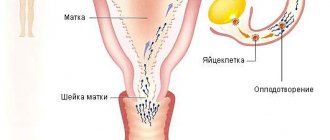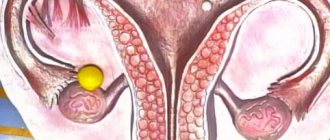Ask a Question! You have questions? Feel free to ask any questions! And our staff specialist will help you. Go>>
Is it possible to get pregnant before your next period? This question worries many girls and women who are planning to conceive or, conversely, taking contraception and not thinking about children. The female body is very complex, and the functioning of the reproductive system depends on many factors. From the article you will learn the likelihood of pregnancy before menstruation and other important points.
Menstrual cycle and pregnancy
The normal length of a woman's cycle ranges from 21 to 35 days. It can be divided into two phases:
The follicular phase begins on the 1st day of menstruation and is characterized by increased production of estrogen hormones. The secretion of steroids becomes possible due to the development of several follicles in the ovaries. High levels of estrogen affect endometrial proliferation. The growth of the inner layer of the uterus to the required thickness is a prerequisite for the subsequent implantation of the fertilized egg in the event of fertilization.
However, only one follicle, called the dominant one, goes through all stages of its development. The surge of LH in the middle of the cycle leads to rupture of the follicular membrane and the release of a mature egg, which is ready for subsequent fertilization. Its viability is 1-2 days. Fertilization occurs in the tube through the fusion of male and female reproductive cells. The introduction of the fertilized egg into the inner layer of the uterus is observed approximately 6 days after fusion.
In place of the follicle membranes, a corpus luteum is formed, which actively synthesizes progesterone, called the pregnancy hormone. The second phase of the cycle lasts from 12 to 14 days.
The most favorable period for fertilization is the day of ovulation. Pregnancy often occurs if sexual intercourse occurs 2 days before the release of the egg. If the sperm has good performance, male reproductive cells retain the ability to fertilize for up to 7 days.
In the absence of pregnancy, the corpus luteum regresses until menstruation. Cyclic changes in hormone levels cause the rejection of the endometrium, which is removed from the uterine cavity due to contraction of the myometrium in the form of bloody discharge.
Cycle phases
Most women cannot get pregnant before their period. To understand why, we need to start by describing the normal menstrual cycle. It is divided into two phases:
- Follicular. This is the first half of the cycle. It lasts on average 2 weeks. This phase of the cycle is highly variable. Significant deviations in its duration are possible. The follicular phase varies from woman to woman. In addition, it may differ in some cycles for one woman, although in most cycles it is stable.
- Luteal. It begins after the follicle with the egg has already ruptured. Has a more stable duration, usually 12-14 days. If there are fluctuations, they are insignificant. The luteal phase is the same for different women. In most cases, it has the same duration in different cycles for one woman.
During the follicular phase, the follicle matures. It begins from the first days of menstrual bleeding. Under the influence of hormones, a vesicle containing an egg grows in the ovary. At the end of the first phase, ovulation occurs. During this period, pregnancy in case of sexual intercourse is most likely.
The luteal phase is needed to support pregnancy. It is characterized by active production of hormones. They are produced by the corpus luteum, which remains at the site of the ruptured follicle. You cannot get pregnant during the luteal phase. She is the one who comes before her period.
Why can't you get pregnant before your period?
Briefly, the cyclical processes in the female body can be described as follows:
- The follicle is growing.
- It bursts and the egg comes out.
- If it is not fertilized, it dies within 24 hours.
- The secretory (luteal) phase lasts for another 2 weeks, and menstruation begins, because the endometrium, which grew to accept the embryo, becomes unnecessary - it is rejected.
Pregnancy is possible only if you have sexual intercourse around ovulation, and not after it. Because at the time the follicle ruptures, sperm should already be in the woman’s genital tract, lying in wait for the egg in order to catch it and fertilize it. If the egg is released but there are no sperm, it quickly dies. After this, you can have sex for 2 weeks or a little less without fear of an unplanned pregnancy.
Is it possible to get pregnant before your period?
Fertilization is possible within 1-2 days after ovulation. Pregnancy covers the period from the moment of implantation of the fertilized egg. Gynecologists emphasize that it is possible to conceive before menstruation by influencing the hormonal levels of internal and external factors.
Approximately 50% of women have irregular cycles, which increases the possibility of conception due to the late onset of ovulation. The duration of the follicular phase may vary. Ovulation can occur either on the 13th or 20th day. Pregnancy is possible several days before the expected menstruation.
If your period is close
The closer to the start of a new period, the more difficult it will be to get pregnant. Since ovulation follows 2 weeks from the start of the cycle. In patients with regular periods, unprotected sex a week before menstruation will not lead to conception in 99% of cases. This is only true if the beginning and end of ovulation can be predicted in advance. However, some women with irregular periods have managed to get pregnant right before their period.
Some have experienced episodes of vaginal bleeding that were mistaken for periods but were not. Since you aren't always sure if the bleeding was a false period, it becomes harder to know how many days before your period you can get pregnant. This is possible, but not very common. For most women, their fertile days are around the middle of their cycle. This window is considered to be the best time to conceive.
How many days before your period can you get pregnant?
The likelihood of conception depends on the timing of the release of the egg and the use of adequate contraception. Hormonal levels are essential.
Is it possible to conceive the day before your period?
The day before your period, you can get pregnant due to hormonal imbalance and a shift in the time of ovulation. Pregnancy is also possible in women with a short cycle with good sperm counts.
Is it possible to get pregnant two days before your period?
If the release of an egg was observed in the middle of the cycle, the possibility of conception can be excluded. Pregnancy is noted when the cycle length changes and late ovulation occurs.
Is it possible to get pregnant 3 days before menstruation?
The chance of getting pregnant before menstruation with a cycle of more than 30 days is practically absent, since ovulation has already occurred. Male reproductive cells do not remain viable until the next release of an egg.
Pregnancy 4 days before period
Gynecologists note that the risk of becoming pregnant before menstruation is minimal. However, it is necessary to remember about the possible shift in the time of ovulation and adequate contraception.
Is it possible to get pregnant 5 days before menstruation?
You can get pregnant before your period if intimacy occurs on the day of ovulation. As a rule, implantation of a fertilized egg is observed 5 days before menstruation.
Is it possible to get pregnant a week before your period?
Women who ovulate spontaneously have a chance of getting pregnant a week before their period. This phenomenon is observed against the background of hormonal imbalance, stress, and weight gain.
Second ovulation occurs in 10% of women. In this case, you can get pregnant a week before your period. Some medications and foods containing natural estrogens can provoke spontaneous ovulation.
Typically, only 1 follicle goes through all phases of development during the cycle. The production of progesterone contributes to the regression of the remaining follicles, which makes repeated ovulation impossible.
Due to various internal and external factors, FSH may be released, stimulating the maturation of several eggs. Sometimes the growth of follicles occurs against the background of the development of the corpus luteum, which sometimes supports hormonal fluctuations.
Pregnancy before menstruation
Quite often, many ladies believe that it is not at all necessary to take protection just before the onset of menstruation, because pregnancy is impossible during this period. But experts categorically disagree with this statement and believe that if the patient has cycle disorders, reproductive problems, inflammatory lesions of the reproductive system and other pathological factors, then fertilization can occur absolutely on any day of the female cycle. Therefore, the onset of conception a week before menstruation and even earlier is quite likely.
Calendar counting of periods is not an accurate way to avoid pregnancy
Young girls whose cycle has not fully formed are more likely to conceive before the onset of menstruation, so such patients are strongly advised not to trust calendar calculations for the purpose of contraception. It is better to trust more reliable methods such as oral or barrier contraception.
There is also a high probability of premenstrual conception in women of mature age, since they gradually begin to experience all kinds of cycle deviations and disturbances in its regularity. If an elderly woman wants to give birth to a baby, then she should assess the situation in advance. If she has a regular cycle, without deviations, unexpected failures or disturbances, then this indicates good health, primarily of the reproductive and endocrine systems. Usually, menstrual irregularities are caused by various pathologies of the genital organs.
Is it possible not to use protection before menstruation?
Women with a stable menstrual cycle often use the calendar method of birth control, believing that pregnancy before menstruation is impossible. If the duration of the cycle is unstable, gynecologists do not recommend calculating days favorable for conception due to hormonal fluctuations.
Conception before menstruation cannot be completely ruled out. The female hormonal background is influenced by many processes occurring in the body and causing a shift in critical days. Thus, unprotected intercourse before menstruation can lead to pregnancy.
Fertilization during menstruation
Is it possible to get pregnant while on your period? This is also quite likely if ovulation is early. The beginning of the menstrual cycle coincides with the first day of menstruation. And if the dominant follicle fully matures and bursts, releasing a viable egg on the 5th or 7th day after the start of menstruation, then conception will become possible. And if the duration of critical days reaches a week, then unprotected sexual intercourse that occurs during this period can actually lead to successful fertilization and subsequent pregnancy.
Getting pregnant before your period is possible. Therefore, if you are not planning a pregnancy, then do not use the calendar method of contraception as your only and main one. If you are planning to conceive, be prepared for the fact that it may well occur before your menstrual period.
(votes: 2, rating: 5.00 out of 5)
Share the news on social networks
Ask a Question! You have questions? Feel free to ask any questions! And our staff specialist will help you. Go>>
- Recommended Articles
- What is a dominant follicle?
- Clearblue pregnancy test
- Is it possible to get pregnant with polycystic ovary syndrome?
« Previous entry
When will the test show if you become pregnant before menstruation?
The test shows the presence of pregnancy when hCG reaches the required concentration. This hormone is actively released after implantation of the fertilized egg. The introduction of a fertilized egg into the uterine mucosa occurs 3-13 days after fusion with the sperm. This is why some women test positive before the delay.
If conception occurred before menstruation with early ovulation, you can find out about pregnancy before the expected critical days. If the egg leaves the follicle late, a rapid test in the first days of the delay may be negative.
Is unprotected sex safe?
Despite hormonal changes in women's bodies, the risk of becoming pregnant before the onset of menstruation is quite high. This is due to cycle disorders, untimely maturation of the egg and the fact that a girl may incorrectly count the days of her menstruation.
With irregular sexual intercourse, a woman’s body may respond with unplanned ovulation to the entry of sperm into the uterine cavity. Intimate relationships with a regular sexual partner give a greater chance of conceiving a child, despite the timing of sexual intercourse.
The microflora of a woman’s vagina perceives ejaculate as foreign bodies, but if the partner is permanent, then the survival rate of sperm increases.
A normal menstrual cycle lasts 28 days, ovulation occurs on days 10–14, but in some cases the release of the egg from the follicle is delayed and occurs on days 18–19. This can also cause pregnancy to occur before your period starts. You can monitor ovulation by measuring basal temperature; the timing of follicle maturation may shift slightly every month, and sometimes anovulation even occurs when the dominant egg does not leave the follicle capsule.
Violation of the timing of ovulation can be caused by taking hormonal drugs, stress, changes in climatic conditions, and a decrease in body weight when a woman has suddenly lost many kilograms.
Opinion of gynecologists
Experts emphasize that there is a low chance of pregnancy before menstruation. According to modern research, the likelihood of conception is due to the following reasons:
- Features of the functioning of the reproductive sphere in a particular woman. The release of a mature egg is not always observed in the middle of the cycle. In some cases, the follicular phase lasts 3 or more weeks, and conception can occur on the days of the expected menstruation. With short cycles, the release of the egg is noted on the 7th day. Thus, you can get pregnant a few days before your period.
- Spontaneous ovulation. Hormonal fluctuations provoke the growth of several follicles during 1 cycle.
- Stop taking COCs. Oral contraceptives suppress the production of hormones, preventing the maturation of eggs. Skipping pills sometimes leads to a reverse reaction in the body, which is manifested by the development of follicles.
Under what conditions does the risk of fertilization before menstruation increase?
Shortly before menstruation, you can become pregnant if you interact with certain internal or external factors. Reasons that increase the likelihood of pregnancy are presented in the table.
| Features of physiology | The calendar method for determining fertility cannot be considered 100% effective. A reliable result can only be demonstrated by a specialized test that can be used at home. For individual reasons, the menstrual cycle may shift slightly, which means that ovulation will not occur at the same time every month. The duration of ovulation and the time of its occurrence are variable. Rarely do women have a stable cycle of 28-32 days. Changes can occur due to a cold, climate change, etc. This is why doctors recommend using tests to determine your fertile period. |
| Sperm viability | It is believed that sperm retain their functionality in the female body for 3 days. In most cases, they live no more than 4 days. This is due to the fact that the female body perceives sperm as foreign cells and directs forces to eliminate them. With a permanent sexual partner, a woman adapts to sperm and her viability increases. The lifespan of sperm during sex with a regular partner increases to 8 days. This is why sexual intercourse before menstruation can lead to fertilization. |
| Repeated ovulation | Sometimes ovulation can occur twice in a month. This happens under the influence of certain factors or individual characteristics of the body. The secondary fertile period can be recognized by the following manifestations: • swelling of the mammary gland and a clear increase in breast sensitivity; • increase in basal body temperature; • increased sexual desire; • pain in the lower abdomen. |
| Taking hormonal drugs | Hormonal drugs affect the performance of the entire body. For example, the risk of pregnancy increases if you stop taking oral contraceptives shortly before your monthly period. This also causes a significant change in the menstrual cycle. Internal contraceptives are aimed at suppressing ovulation. After stopping the use of medications, the likelihood of multiple eggs maturing at once increases. The occurrence of twins in women after using these medications is also associated with this. It is important to consult your doctor before stopping hormonal medications. Only in this case everything will go well and will not harm the body. |
Cycle disruptions are also the result of recent use of antibacterial medications or exposure to various diseases. Such factors lead to delays in menstruation and significant shifts in the ovulatory period. That is why you cannot rely only on the calendar method of establishing the fertile period.
Taking antibiotics can cause cycle disruption
On the other hand, many women, before approaching menstruation, experience physical and mental discomfort, which is called PMS. The symptoms of this period depend on the individual characteristics of each woman’s body. The most common symptoms of PMS are pain in the lower abdomen, headaches, and frequent mood swings.
The second half of the menstrual cycle, which also includes several days before the upcoming menstruation, is characterized by a significantly lower concentration of sex hormones that are responsible for sexual desire (progesterone and estrogen). Immediately before menstruation, cortisol levels increase, which affects your well-being.
The days after ovulation are generally considered unfavorable for conception, and the risk of fertilization is defined as close to zero. That is why it is necessary to monitor your cycle and know on which days there is a risk of unwanted pregnancy. For many women, a sign of increased fertility is the appearance of mucus before menstruation (the so-called cervical mucus). The lowest chance of getting pregnant, and therefore the safest sex before menstruation, is possible when mucus:
- opaque or even cloudy;
- has a sticky and viscous consistency;
- has a characteristic whitish or yellowish tint.
For many decades, it was believed that unprotected intercourse immediately before or during menstruation was completely safe. However, this opinion is wrong.
The study of cervical mucus is not at all the only and most reliable indicator of assessing fertility. If a woman's menstrual cycle lasts less than 26 days, the risk of pregnancy increases significantly. The fact is that such a short cycle is fraught with early onset of ovulation, and therefore the woman is fertile throughout almost the entire cycle.
You can also get pregnant before your period if you confuse it with bleeding during ovulation. Such bleeding appears approximately in the middle of the cycle; an additional symptom can also be an increase in basal body temperature. Women who regularly measure their body temperature may notice that it increases significantly in the second phase of the cycle. Basal temperature reaches its highest levels a few days before menstruation.
It is worth considering that if the cycle is irregular and is characterized by periodic disruptions, then the possibility of getting pregnant exists throughout the entire period, including the days before menstruation.
Many women experience increased sexual desire during menstruation or the day before bleeding occurs. Sexual contact during menstruation itself is most pleasant for both partners, which is explained by increased sensitivity and excitability. However, such intercourse should be pleasant not only in a physiological, but in a psychological sense.
Normal menstrual cycle
It is known that the duration of all phases of the menstrual cycle is 21 – 35 days. Each of them plays a specific role in childbirth. The cycle begins with menstruation, which normally lasts from 3 to 7 days.
The body then prepares for ovulation. The pituitary gland produces a specific hormone that causes the ovaries to produce eggs. Initially, they are immature and are located in follicle vesicles. One vesicle develops faster than its “neighbors” and in the next phase of the cycle is transformed into a mature egg. It takes an average of 12 days to prepare for ovulation.
When the hormone level reaches its maximum, the mature egg is released from its shell. This is how ovulation begins - the most productive phase for conception.
The female cell is waiting to meet the male seed. But her ability to fertilize lasts only a couple of days. If fertilization does not occur, the next phase takes effect.
The unused egg, along with the uterine lining that would be useful in case of pregnancy, is gradually rejected. It is difficult to determine exactly how long this process will take. This is approximately 10 – 14 days. Then the woman gets her period again and the cycle repeats.
At first glance, it may seem that the calendar method reliably protects against pregnancy, because it is very easy to calculate the date of ovulation and abstain from sexual intercourse during this period. The rest of the time you can not use contraceptives and enjoy love. However, in some cases this scheme does not work.
When does the likelihood of getting pregnant before your period increase?
If a woman is ready for the birth of a child and deliberately neglects contraceptives, she will have a chance to get pregnant even 1 day before the start of menstruation.
As mentioned above, under normal conditions, ovulation occurs in the middle of the cycle, i.e., divide 28 by 2 and get the 14th day. The egg is viable for 2 days, sometimes less - 1 day or several hours.
The sperm lives in the unprotected genital tract for 3–11 days. If the semen is of poor quality, the sperm in it may be dead. It turns out that the lifespan of an egg is 2 days, and that of a sperm is 3 days.
A woman with a stable 4-week cycle should understand what her chances of becoming pregnant before her period are. By determining the middle of the cycle and adding 6 days around (plus or minus), you can find out the most successful days for fertilization.
But you shouldn’t rely completely on the schedule, since sperm can live longer, and the date of ovulation can shift.
With the onset of menstruation, the chances of pregnancy are almost zero, unless ovulation occurs very early and the phases have shifted. The presence of sperm in the genital tract does not guarantee conception.
For fertilization, you need a high-quality seed, released by the male organ in sufficient quantity and containing a large number of active sperm. Sluggish and lifeless cells that find themselves in the female body on a day suitable for fertilization are unlikely to ensure conception.
Counting the safe days
Calculating safe days when you can have unprotected sex without the possibility of conception is quite difficult. Women with a regular menstrual cycle and no gynecological diseases have a better chance.
When menstruation occurs, fragments of the endometrium are washed out of the uterus along with blood and mucus, and the egg is also released. If sex occurs before the onset of menstruation, then there are no suitable conditions for fertilization and attachment of the fertilized egg, and conception does not occur.
The calendar method for calculating safe days takes into account the timing of ovulation. The lowest probability of fertilization occurs in the last 2 days before menstruation and the same period after their end. A woman needs to mark the beginning and end of her period on the calendar and measure her basal temperature.
The highest risk of conception is on days 12–16. If there are disturbances in the ovulation process or the menstrual cycle, this method of contraception is ineffective and can lead to an unwanted pregnancy.
“Safe” also includes 2 days after menstruation, but it should be borne in mind that the sperm after entering the female body can survive up to 3 days, so the calendar method of contraception is unreliable. It does not take into account many individual characteristics of partners.
Cervical mucus
By the nature of vaginal discharge, you can determine the timing of ovulation and thereby calculate the most likely days for conception and the period when fertility is minimal. Immediately after the end of menstruation, cervical mucus thickens and closes the cervical canal. “Dry days” last for 2–3 days.
Gradually the secretion begins to liquefy. During ovulation, it becomes viscous and resembles egg white in appearance. This is the most dangerous period when the body is ready to conceive. Then the discharge begins to gradually thicken.
The last day, when the most viscous mucus is released, is considered the peak. After it, for another 3 days there is a high risk of pregnancy. Starting from the fourth dry day until the start of menstruation, the safe period begins.
The appearance of pus or a change in the color of the discharge may be a symptom of infectious diseases. In such cases, you should immediately consult a doctor.
When is there a risk of fertilization before menstruation?
Women also hear a positive answer to the question whether it is possible to get pregnant before the onset of menstruation from gynecologists. Doctors voice reasons that increase the likelihood of conception in anticipation of the critical days.
Under what conditions is fertilization possible:
- Irregular cycle. For many women, their period does not come on the expected date. Delayed ovulation disrupts the schedule of safe days and affects the timeliness of bleeding. The period that was unsuitable for conception last month becomes favorable for fertilization in the current cycle. For this reason, the risk of becoming pregnant exists even 10 days before the start of your period. With an established cycle, women sometimes experience disruptions. Menstruation shifts under the influence of hormonal fluctuations, weather, stress, and illness. Ovulation occurs earlier or later. In the week before their period, women have a 35% chance of becoming pregnant.
- Cancellation of hormonal contraceptives. If a woman took birth control pills, but subsequently abandoned them, the hormonal levels gradually return to the original criteria. Two eggs can mature in the reproductive system at the same time, and this phenomenon increases the likelihood of conception when there are 1, 2 or 3 days left before menstruation. While the woman was taking oral contraceptives, their components inhibited the process of egg maturation and maintained hormonal stability. In due course, menstrual-like discharge flowed from the genital tract, which is not real menstruation.
- Repeated ovulation. Women don’t even realize that 1–2 times a year, one of the cycles starts the process of maturation of two eggs. The first ovulation, as expected, occurs in the middle of the cycle. The second is unpredictable, it happens at any time. If ovulation occurs again shortly before menstruation, there is a danger of conception when pregnancy is not needed.
Repeated ovulation is typical for women who do not have regular sex life. In this case, the reproductive system works so that the possibility of conception is maximized.
Other causes of unplanned pregnancy before menstruation
Let's consider the question of whether you can get pregnant before your period in a few days or not from the point of view of immunity. With a permanent sexual partner, a woman’s immune system gets used to sperm and increases their viability. Thanks to this, the “live ones” have an increased chance of safely reaching the egg.
If sex is irregular or the partners are casual, the male seed is viable for only 3 days. In a relationship with a regular partner, the survival rate of ejaculate increases to 7 days. Therefore, it is quite possible to conceive a child on the eve of menstruation. It is also necessary to take into account that if intimacy takes place 2 - 3 days before ovulation, sperm have a chance to meet the egg.
The reasons why a woman may become pregnant before her period include hormonal surges. The state of the hormonal system affects the female body as a whole and determines its ability to conceive.
Hormone levels are affected by various factors:
- Body temperature.
- Environmental conditions.
- Psycho-emotional state.
- Change of time or climate zone.
- Increase/decrease the length of the day.
Pregnancy or cycle failure
On forums, women often ask the following questions:
Can I be pregnant if I had unprotected intercourse before my period?
Conception can occur in young girls when the cycle is not formed, the release of the egg occurs at any phase, or in women with hormonal imbalances before menopause. The process is called early or repeated ovulation. The probability of conception is high.
If a woman gets pregnant before her period, will she go?
Yes, that's why it's important to think about how to protect yourself when having sex before your period. Interrupted sexual intercourse or the use of emergency contraception after sex before menstruation can lead to hormonal disruption - speed up discharge or delay it. There are cases of women becoming pregnant. During this period, the following methods must be used:
- hormonal pills prescribed by a doctor;
- intrauterine device;
- condom;
- diaphragm.
Contraceptives are important for safety during the premenstrual period, since the uterus can open slightly at any time, indicating that your period has started during sex. The exfoliated epithelium will begin to come out - the chance of bacterial penetration increases.
Methods increase mucus viscosity and moisturize. The use of protection makes it impossible to conceive before menstruation with early ovulation syndrome.
But the main rule is to understand that discharge can begin at any time during the act. You should not use complex positions with very deep penetration. Microcracks cause bleeding and can provoke diseases of the reproductive system.
Is it possible to have sex while delayed?
The absence of menstruation does not always mean conception; it may be the first sign of a disease, therefore, before engaging in intimate intimacy, you should find out the reason for the failure of the regulation.
Knowing your own body and calculating “safe” days will make sex before menstruation a pleasant process for both partners. Sex before the onset of discharge is not safe even for women with a regular cycle; there is a risk of conceiving a child. Delay sexual intercourse and be sure to provide a method of contraception and intimate hygiene products.
A normal intimate life is a prerequisite for physical health and psychological comfort. The most common problem that can prevent this is the fear of unwanted pregnancy. There are other concerns associated with the cyclical development of the female reproductive system. What should intimate life be like so that you don’t have to expect problems from it? Will sex before your period help you avoid unwanted pregnancy?
Read in this article
Learning to determine fertile days
Menstruation is a shedding of the endometrial layer, accompanied by bleeding. This happens at the end of the ovulation cycle due to the fact that the egg has not been fertilized. The ovulation cycle refers to the release of a mature egg from a woman’s ovary into the fallopian tube to enable fertilization. The most favorable days for this are called fertile.
The release of the egg often occurs in the middle of the cycle, the duration of which is absolutely individual for each woman. On average, this moment occurs on the 14th day of the cycle. To make conception more comfortable, the lining of the uterus thickens, creating a so-called “cushion”. From the moment the egg is released, the fertile period lasts approximately 5-6 days. Sperm activity most often does not exceed 3 days, and the egg’s ability to fertilize is 24 hours. Based on this, we can conclude that it is impossible to get pregnant immediately before your period. However, this statement has a number of contradictions.
When can pregnancy occur?
Conception is possible during ovulation, during which a viable and fully mature egg is released from a ruptured follicle and travels through the fallopian tube from the ovary to the uterus to unite with a sperm. The day the female reproductive ovum matures depends on the length of the menstrual cycle, but it is not easy to determine it exactly.
With a cycle length of 25-28 days, ovulation usually occurs on the 12th, 13th or 14th day. If the cycle lasts 30 days, then the mature egg is released from the ruptured follicle around the 15th or 16th day. It is logical that the chances of successful conception reach their maximum on these days. But it is worth considering other factors, namely the viability of sperm.
Male reproductive cells can remain viable and active in a woman’s body for several days. According to various sources, they die 3-5 days after entering the vagina during sexual intercourse. But the period of viability depends on the compatibility of partners, the health of the man, the characteristics of the female reproductive system and other factors. Therefore, the duration can be shortened or increased.
The egg lives and remains active for much less time - no more than a day. And if we take into account the periods of viability of female and male reproductive cells, we can come to the conclusion that the maximum probability of conception lasts for 5-6 days. A sperm that enters the vagina and reaches the uterus even a few days before ovulation is fully capable of fertilization if it remains viable until that moment.
Reasons that increase the likelihood of conceiving before menstruation
On average, the menstrual cycle lasts 28 days, but for many representatives of the fair sex, the duration of this period can be variable. The same applies to the regularity of critical days. Thus, it is not possible to derive a single formula for determining fertility or the impossibility of conception. In addition, there are a number of other reasons that increase the likelihood of pregnancy before menstruation.
Individual characteristics of physiology
The calendar method of calculating fertility has long been considered unreliable, but many women continue to use it as their only method of contraception. The failure of this method is that the menstrual cycle tends to shift. This means that the duration and regularity of ovulation and menstruation are constantly subject to change.
For some women, the cycle is actually normal, which is 28-32 days, but due to various external and internal factors, this stability can be disrupted at any time. The causes of irregularity can be various nervous strains, illnesses, hormonal changes, unusual climatic conditions, change of sexual partner, irregular sex, and so on.
When calculating days that exclude conception using the calendar method, many women do not take into account the fact that those days that were safe in the last cycle may become fertile in this one. That is why individual physiological characteristics associated with the irregularity of menstrual cycles are one of the main reasons for pregnancy before menstruation.
Life span of sperm
There is a widespread belief that sperm inside the female body can exist for no more than 3 days. To some extent, this statement is not without meaning, but it is also impossible to call it true.
Often, when most sperm enter the uterus, they die under the influence of the environment within 2-4 days. This is due to the fact that the woman’s immune system recognizes foreign genetic material in them and, accordingly, destroys it for protection. But the lifespan of sperm can be much longer if the sexual partner is constant. A woman's immune system gradually adapts to male reproductive cells and, over time, reacts to their presence less aggressively. Thus, the life span of sperm can increase from 5 to 8 days.
Is it possible to get pregnant before menstruation?
So is it possible to get pregnant before your period? Conception is theoretically impossible, but in fact it can happen. The female body is an extremely complex mechanism, the functioning of which depends on many factors: both external and internal. For example, it is influenced by hormonal levels: the level of hormones that changes during the menstrual cycle affects the ongoing processes and reactions. A lot depends on the lifestyle of the fairer sex. Cases in which pregnancy before menstruation becomes possible are discussed below.
Myths and reality
Due to the fact that the female body is prone to instability in the course of the menstrual cycle, it is impossible to unequivocally answer the question of whether it is possible to get pregnant before menstruation or the day before menstruation. It is also almost impossible to determine favorable and unfavorable days for conception, which negates the possibility of a calendar method of contraception or pregnancy planning. Constantly measuring basal body temperature, regularly keeping a menstrual diary, using all kinds of hormonal contraception and other methods of preventing unwanted conception before menstruation can only slightly reduce the likelihood. However, despite all of the above, today there are many myths associated with the possibility of preventing pregnancy through unprotected intercourse before menstruation.
Safe sexual intercourse a few days before menstruation
Many women practice unprotected sexual intercourse one, two or even three days before their period, considering this to be absolutely safe in the matter of unwanted pregnancy. However, multiple clinical studies prove that the likelihood of conception during this period is present, although not too high. This is due to many physiological factors in the woman’s body and various external influences. Therefore, the myth about the complete safety of unprotected sex a few days before menstruation can be considered completely refuted.
Use of hormonal contraceptives
Another significant misconception about pregnancy before menstruation is the use of hormonal contraception. Many girls and women believe that long-term use of this type of medication has an accumulation effect and interrupting or stopping the use of contraceptives for a short time will not affect the effectiveness of the drugs. However, this statement is completely unreliable. In reality, interrupting the use of hormonal contraceptives leads to a decrease in their therapeutic effect, but completely abandoning them significantly increases the likelihood of pregnancy. As mentioned above, due to cessation of use, the formation of several viable eggs is possible due to the rapid return to normal of the woman’s hormonal levels. Because of this effect, many doctors use hormonal contraceptive medications to treat infertility in women. Thus, this myth is also considered refuted.
First sexual intercourse
One of the strangest and at the same time popular myths is the assertion that the first sexual intercourse one or two days before menstruation cannot lead to pregnancy. The strangeness of this misconception lies primarily in the fact that we are talking specifically about the first sexual intercourse on the eve of menstruation, which makes it a little fantastic and completely unscientific. The fact is that absolutely any unprotected sex can lead to unwanted conception, regardless of the order of the acts. That is, pregnancy can occur both for the first and tenth time. According to statistics, the probability of conception on such days varies from 1% to 10%, depending on the physiological characteristics of the woman’s body.
That is why, to be more confident in the impossibility of getting pregnant before menstruation or even the day before menstruation, it is necessary to choose the right and reliable method of contraception. Condoms are the best choice today, as they protect not only from unwanted conception, but also from many sexually transmitted diseases.
The difference between sex after regulation and intimacy before bleeding begins
Advantages and disadvantages are divided according to criteria such as the ability to get pregnant, the risk of infections in the vagina, and the level of desire.
Ovulation does not occur immediately after the discharge stops. The risk of becoming pregnant and introducing bacteria is reduced, since the uterus does not open to remove the exfoliated epithelium. Having sex in the first week after your period is relatively safe. Indeed, in individual cases, ovulation does not occur 5 days (approximately) after the end of bleeding, but always within 2, 3 or 4 days. During this period, the sperm fertilizes the egg. This factor is positive for those who are planning to conceive and is especially unfavorable for those who are in no hurry to get pregnant.
But what exactly indicates the disadvantage of sex after menstruation is the state of the female body. At the first signs of PMS, hormones responsible for libido are intensively produced. A girl's sensitivity and desire for sex the day before her expected period is higher than after the end of her period. By the end of menstruation, the body is a little exhausted - hormones are not active enough. A woman feels tired or even stressed, so her attraction to her partner decreases.
Even more interesting:
Unidox for acne
Ovarian inflammation symptoms
Three days before ovulation, libido increases again. To avoid unwanted pregnancy and infections, it is important to follow a number of recommendations - choose the appropriate method of contraception, determine the phases of the cycle.
Conception before menstruation
Research shows that the chance of getting pregnant exists on absolutely any day of the cycle. The most favorable period for this is the period of ovulation, but on other days this opportunity remains with a lower percentage. Therefore, the answer to the question of whether it is possible to get pregnant before your period or the day before your period is definitely positive. We must also not forget that after the critical days, the likelihood of pregnancy increases sharply, and in the case of unprotected sexual intercourse with a regular partner before menstruation, conception may well occur. This is due to the fact that sperm can remain viable throughout the entire period of menstrual bleeding.
Based on the above material, we can conclude that it is quite possible to become pregnant before your period or the day before your period. That is why it is better to contact a qualified specialist with questions about unwanted pregnancy and choose the most suitable and reliable method of contraception.
Impact of hormonal drugs
It is possible to become pregnant during menstruation even if the woman is taking hormonal contraceptives. As a rule, the course of these drugs is structured so that during menstruation the woman takes a placebo.
Most women note that spotting during the period of taking the pills differs from normal menstruation. This is due to the fact that these discharges are not menstruation, but bleeding, which is caused by the cessation of hormones entering the body. At the same time, the hormonal background changes, and the likelihood of getting pregnant increases. This poses some dangers to the health of women and children. The fact is that a woman can become pregnant during her period and not even know it. The bloody discharge will continue, but its nature will change in one way or another. In most cases, even if the egg is fertilized, it will be released from the body along with the blood, but this does not happen in all cases, although the likelihood of becoming pregnant is very small.
The close relationship of all processes of the endocrine system determines the effect of any hormonal drugs on reproductive function. Therefore, those women who do not know whether it is possible to get pregnant before and during menstruation should consider whether they are taking hormonal medications or not.











